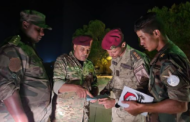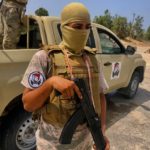Aug. 31, Al-Kikli’s Stability Support Force militiamen clash with Misurata-based Joint Force clash near Administrative Control Authority HQ in Tripoli.
Sep. 3, LNA-affiliated Tariq bin Ziyad Brigade arrests Brak El-Shati massacre accomplice terrorist Al-Hasnawi, discovers arms, ammo cache near detainee’s hideout.
Aug. 30, Union of Libyan Tribes accuses Turkey of spreading terrorism in Libya, Tunisia by sending foreign combatants.
TRIPOLI
- Aug. 31, armed clashes took place in the vicinity of the Administrative Control Authority (ACA) headquarters in Tripoli between the guards of ACA deputy head, Khaled Dhaou, affiliated with the “Stability Support Force”, led by Abdel-Ghani Al-Kikli (Ghneiwa) and the guards of ACA Head, Suleiman Al-Shanti, affiliated with the “Joint Force” from Misrata. Pickup trucks carrying fighters rushed to the ACA headquarters, creating a state of panic among the authority’s employees present in the building, and the nearby residents as a result of heavy gunfire between the two armed groups. The two officials were appointed by different political entities, and there had been an ongoing dispute over the legitimacy of each person;

- Armed clashes erupted early Sep. 3 between the Stability Support Force (SSF) affiliated with the Presidential Council, and the 444th Combat Brigade affiliated with the Chief of Staff of the Government of National Unity (GNU). Members of the 444th Brigade stated that they were able to keep control Al-Takbali Camp in the Salah Al-Din area, southern Tripoli, after the SSF attempted to take control of the camp. They added that they had captured a number of SSF members, in addition to looting cars from the attacking force. Pictures and video clips published online showed handcuffed SSF members that were arrested after the clashes.
NATIONAL POLITICS AND SOCIAL ISSUES
- Sep. 4, members of the Energy Committee of the Libyan House of Representatives (HoR) demanded the assignment of a new Board of Directors to the National Oil Corporation (NOC). In a statement signed by 8 members, they said that the measures taken by the Minister of Oil, Mohamed Aoun, are within his competence and this firmness in enforcing the law is what the country needs, especially with the increasing volume of abuses in all sectors. They stressed the need to keep the NOC away from any conflict and support it professionally to maintain its international and local status and the trust of partners;
- Sep. 4, the Libyan House of Representatives (HoR) responded to the Government of National Unity (GNU) that asked for details pertaining to the questioning so that the Ministers can prepare their responses professionally. The Parliament sent an abundant number of questions prepared by its committees’ members for discussion during the coming questioning session scheduled to be held at the Parliament’s headquarters next Tuesday. According to a letter addressed by the HoR to the government, the files of electricity, cash flow, unification of institutions, the coronavirus pandemic, and the state’s general budget would be at the focus of questions;
- Sep. 1, the Libyan Minister of Foreign Affairs, Najla Al-Mangoush, met with the Head of the Libyan Presidential Council, Mohamed Al-Mnifi. They discussed the results of the foreign ministers meeting between Libya’s neighbouring countries, which was being held in Algiers. During their meeting, Al-Mangoush also briefed Al-Mnifi on the details of her invitation to hold an international conference chaired and organised by Libya at the end of this month, on the initiative to stabilise Libya. She pointed out the willingness by neighbouring states to participate in this conference, being the first purely Libyan initiative;
- The Chairman of the Board of Directors of Libya’s National Oil Corporation (NOC), Mustafa Sanalla rejected an attempt by the Minister of Oil, Mohamed Aoun to suspend him and dissolve the board. During an interview with the Asharq Business newspaper in Tripoli, Sanalla said that “the Oil Minister cannot legally suspend me from work or refer me for investigations. The cabinet is the decision maker and has the last word on the NOC.” The interview came days after Aoun called for Sanalla to step down, due to his violation of rules related to business travel.
NATIONAL SECURITY
- Sep. 5, the Libyan 5 + 5 Joint Military Committee (JMC) supervised a new operation to release and exchange prisoners between the Libyan National Army (LNA) and the forces of the Western Region. This was part of the implementation of the ceasefire agreement signed between the two sides of the conflict in Geneva in October last year. The operation took place in coordination with the Committee of Prisoners and Missing Persons in the Central Region and in the presence of dignitaries and wise men from the cities of Misrata, Gharyan as well as the Libyan Red Crescent. Seven prisoners of the LNA and eight prisoners of the Forces of the Western Region were released;

- Sep. 3, the Libyan National Army (LNA)-affiliated Tariq bin Ziyad Brigade arrested one of the terrorists involved in the Brak El-Shati massacre, which killed 148 Libyan civilians and soldiers. In a statement, the Military Information Division said, “after receiving intelligence information about the places where the terrorist Ali Al-Ajili Al-Hasnawi was hiding, a reconnaissance company affiliated to Tariq bin Ziyad, rushed to a location near the Brak Al-Shati base, and arrested the prominent terrorist. It added that an arsenal of weapons, including missiles and multi-purpose machine guns, as well as explosive devices, were seized, “as Al-Hasnawi was planning to implement terrorist operations in the southern region.” A chemical laboratory for the manufacture of explosive devices and several IED’s were also discovered.

- Notably, the arrested criminal was a commander of a terrorist group affiliated with Ahmed Abdel-Jalil Al-Hasnawi, a prominent leader of Al-Qaeda in Morocco.Italian Defence Minister, Lorenzo Guerini, said that the situation in Libya continues to be a highly complex one, reiterating that Libya’s stability is an essential requirement of Rome’s security strategy. During a meeting in Washington with the United States (US) Secretary of Defence, Lloyd J. Austin, Guerini underlined that Italy will continue to contribute to the political effort to facilitate intra-Libyan dialogue and to fully support the action of the United Nations (UN). According to AgenPress, the Italian Minister added that Rome will also implement its commitment in Africa, in particular in the Sahel area, whose fragility represents a real security threat;
- The Director of the Syrian Observatory for Human Rights (SOHR), Rami Abdel-Rahman stated that members of the Al-Hamza militia held demonstrations at a Turkish-run military base in Libya, to protest their conditions and the reduction of their salaries to 300 USD. He added that these fighters demanded their leaders pay then 1,000 USD, and return them to Syria.
INTERNATIONAL RELATIONS
- The Greek Foreign Affairs Minister, Nikos Dendias, will meet with his Libyan counterpart, Najla Mangoush, in Athens next Monday, Sep. 6, according to the Athens-Macedonian News Agency (ANA-MPA). During the meeting, the two sides will discuss the bilateral relations between Libya and Greece. They will also discuss the developments in the larger Mediterranean region;
- Sep. 4, the Egyptian President Abdel-Fattah El-Sisi stressed the need to remove all foreign forces and mercenaries from Libya. During a meeting with his Cypriot counterpart, Nicos Anastasiades, in Cairo, President El-Sisi highlighted the importance of holding the Libyan parliamentary and presidential elections as scheduled. He also called for Libya to preserve its capabilities and build its future without any foreign interference. El-Sisi indicated that the elections would terminate the extended transitional state and put an end to the state of Libyan division;
- Sep. 3, the Libyan National Army (LNA)-affiliated Tariq bin Ziyad Brigade arrested one of the terrorists involved in the Brak El-Shati massacre, which killed 148 Libyan civilians and soldiers. In a statement, the Military Information Division said, “after receiving intelligence information about the places where the terrorist Ali Al-Ajili Al-Hasnawi was hiding, a reconnaissance company affiliated to Tariq bin Ziyad, rushed to a location near the Brak Al-Shati base, and arrested the prominent terrorist. It added that an arsenal of weapons, including missiles and multi-purpose machine guns, as well as explosive devices, were seized, “as Al-Hasnawi was planning to implement terrorist operations in the southern region.” A chemical laboratory for the manufacture of explosive devices and several IED’s were also discovered;
- Sep. 1, France called on all Libyan parties to assume their responsibilities, and respect the date of the general elections, which local officials no longer rule out delaying. A spokesman for the French Foreign Ministry said that, “the holding of legislative and presidential elections on 24 December 2021 is necessary for stability and political reconciliation in Libya… We call on all Libyan leaders to assume their responsibilities without delay to achieve this process.”
- Aug. 30, the Union of Libyan Tribes issued a statement accusing Turkey of spreading terrorism in Libya and Tunisia by “sending planes loaded with mercenaries and terrorists to the two North African neighbours.” The statement added that the Libyan and Tunisian peoples are being subjected to terrorism backed by Turkey, “and this is documented with evidence, and in full view and hearing of the international community”;

- As Ireland is preparing to assume the presidency of the Security Council in September, the Irish gov.ie website reports that Libya will be at the top of the Security Council’s work list, in addition to other issues, including the humanitarian crisis in Syria, the military situation in Afghanistan, and the Iranian nuclear agreement;
- Sep. 1, the United States welcomed the results of the consultative meeting by the foreign ministers of Libya’s neighbours, which was held in Algeria, as an important step to support regional stability. In a tweet by the US Embassy in Libya, it reiterated the necessity of holding the presidential and parliamentary elections on schedule, and the need for foreign forces to withdraw from the country;
- Sep. 1, it was reported Egypt will host the next round of talks for the foreign ministers of Libya’s neighbouring countries, with the aim of reaching a political solution to the crisis. The final statement of the meeting welcomed the proposal by Egypt to host the upcoming meeting. During the meeting in Algeria, Egyptian Foreign Minister Sameh Shoukry urged support for Libya’s 5+5 Joint Military Commission (JMC), to ensure the departure of all foreign forces and mercenaries from the oil-rich country;
- Aug. 31, the Libyan Minister of Foreign Affairs, Najla Al-Mangoush expressed her thanks and appreciation to Algeria, its presidency, government, and people for their continuous support for Libya. In her speech during the reception of Algerian President Abdelmadjid Tebboune, she also highlighted that the call by neighbouring countries’ to hold this meeting confirms their interest in achieving stability in Libya;
- The Russian Foreign Ministry announced Aug. 30 that Russian Deputy Foreign Minister, Sergey Vershinin met with Paul Soler, the French Special Envoy to Libya. They discussed the situation in the country, as well as the role of the UN Security Council in the peace process. The two sides exchanged points of view on a number of issues that are on the agenda of the UN Security Council, according to a statement by the Russian Foreign Ministry. In accordance with the Security Council’s resolutions, a specific emphasis was placed on enhancing international coordination to promote the Libyan political process, with the UN playing a prominent role, the ministry said in its statement;
- The Tunisian Minister of Foreign Affairs, Othman Jerandi stressed that Tunisia has always confirmed “on every occasion and at all bilateral, regional and international levels that the security and stability of Libya is important to Tunisia’s security and stability.” In his speech during a meeting of Libya’s neighbouring countries held in Algeria, Jerandi added that Tunisia has spared no effort in supporting Libya in restoring stability, away from any foreign interference in Libya’s internal affairs. The FM stressed that the existing challenges, foremost of which are the security challenges related to terrorism and organized crime, require greater caution, and careful joint coordination. He noted that the existing challenges also need to be separated from anything that could harm bilateral relations;
- Aug. 30, Libyan Foreign Minister, Najla Al-Mangoush held talks with her Egyptian counterpart, Sameh Shoukry on the sidelines of foreign ministers meeting of Libya’s neighbours in Algeria. The Egyptian Foreign Ministry said in a statement that the two discussed bilateral cooperation frameworks, as well as coordination regarding the proposals put forward during the meeting, “to reaching a comprehensive political settlement of the Libyan crisis.”
- Aug. 30, Egyptian Foreign Minister, Sameh Shoukry urged support for Libya’s 5+5 Joint Military Commission (JMC), to ensure the departure of all foreign forces and mercenaries from the oil-rich country. The JMC has called for the freezing of all military and security MoU’s signed with foreign countries, “so that the commission can begin the procedures for implementing the exit of all mercenaries, fighters, and foreign forces from the country.”
- Aug. 30, Libyan Minister of Foreign Affairs in the Government of National Unity (GNU), Najla Al-Mangoush, held talks with her Algerian counterpart, Ramtane Lamamra, in Algiers. The talks came on the sidelines of the foreign ministers meeting of Libya’s neighbouring countries, which aims to help Libya hold the upcoming 24 December elections. Lamamra praised the “depth of the distinguished relations that bind the two brotherly Libyan-Algerian peoples.” He stressed that the ministerial meeting aims to unify efforts to support maintaining stability in Libya, in coordination with the African Union. In turn, Al-Mangoush expressed her thanks and appreciation to her Algerian counterpart for his keenness to support the Libyan people, and strengthen all endeavours to achieve a comprehensive political settlement of the crisis, and unify Libya’s national institutions.

- Aug. 30, Libya’s Minister of Foreign Affairs, Najla Al-Mangoush called on neighbouring countries to support and adopt the Libya Stability Initiative, and invited them to participate in an international conference that Libya will organise in late September. During her speech at a foreign minister’s meeting of Libya’s neighbours in Algeria Aug. 30, Al-Mangoush explained that the aim of the initiative is to be Libyan-led and internationally supported in order to allow the Libyan people choose their own future;
- During a foreign minister’s meeting of Libya’s neighbours in Algeria, the Head of United Nations Support Mission in Libya (UNSMIL), Jan Kubis, condemned the continued presence of mercenaries and foreign forces in the country. He stated that they remained as a cause for concern for Libya and the international community, including neighbouring countries. Kubis added that the Security Council in a number of resolutions strongly urged all member states, all Libyan parties, and all relevant actors to respect and support the full implementation of the October ceasefire agreement, including the withdrawal of all mercenaries, foreign fighters, and foreign forces from Libya without delay;
- Aug. 30, the Union of Libyan Tribes issued a statement accusing Turkey of spreading terrorism in Libya and Tunisia by “sending planes loaded with mercenaries and terrorists to the two North African neighbours.” The statement added that the Libyan and Tunisian peoples are being subjected to terrorism backed by Turkey, “and this is documented with evidence, and in full view and hearing of the international community”.



























